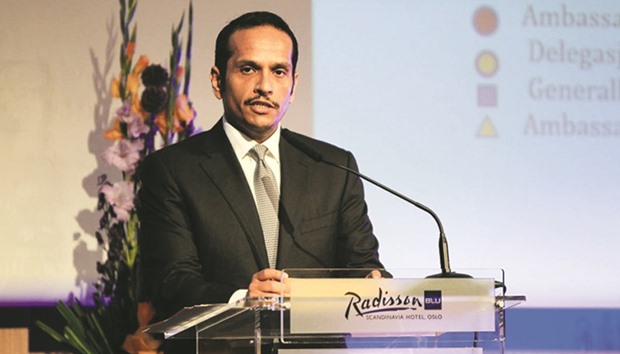HE the Foreign Minister Sheikh Mohamed bin Abdulrahman al-Thani stressed that Qatar is determined to be a force for good in the world and to play an active role in promoting peace.
Speaking in Oslo at the annual gathering of Norway’s ambassadors serving abroad, the Foreign Minister said “Qatar’s foreign policy is based on four main pillars, namely – consolidating international peace and security by encouraging the peaceful resolution of international disputes, supporting the right to self-determination, non-interference in the domestic affairs of other states, and co-operation with all nations that seek peace.”
HE Sheikh Mohamed bin Abdulrahman al-Thani noted that Norway is not only the home of the Nobel Peace Prize but also a major player in conflict resolution for decades.
The Foreign Minister pointed to some significant roles that Qatar played to promote peace and resolve regional conflicts, such as successfully brokering the Doha agreements between rival Lebanese factions in 2008, and its leadership role in peace efforts in Sudan, convening peace talks in Doha before hosting an international donor conference for reconstruction and development in Darfur.
The Foreign Minister touched on Qatar’s efforts to enhance peace in Libya, noting that Doha has successfully mediated between the Tebu and Taureg tribes in Libya, resulting in the signing of a peace and reconciliation agreement in Doha.
HE Sheikh Adulrahman al-Thani added that Qatar also helped resolve a border dispute between Djibouti and Eritrea in 2010.
“In every mediation effort, we kept our doors open to all parties in the dispute in order to bring about a lasting peace,” he said.
The Minister highlighted the need for peace efforts in the Middle East.
“I think it is obvious to all of us that the importance of peace-making and reconciliation efforts in the Middle East has never been more critical than it is today,” he said, adding that Qatar was and remains a strong supporter of the Palestinian issue.
Calling for an end to the ongoing fighting in some Arab countries, the Foreign Minister said: “The fighting in Syria, in Iraq, in Libya and Yemen must come to an end. Because the longer the fighting lasts, the greater the sacrifice of human capital, and more children will be deprived of their right to an education.”
“And the longer the fighting, the more likely that moderate young men and women will be radicalised and lured into the extremist camp as a result of their desperation and hopelessness,” he added.
“The people of the Middle East did not choose to live in an environment of terrorism and sectarian violence.
History shows that we are a people of tolerance and coexistence, regardless of our different backgrounds, ethnicities, religions, or sects,” he added.
The Foreign Minister said more should be done “to give the people of the Middle East the opportunity to hope for a better future.”
“The people of the Middle East deserve governments that are responsive to their hopes and needs and which ensure that their rights are protected. The people of the Middle East deserve to live in a society that ensures equity instead of inequality,” Sheikh Mohamed said.

HE the Foreign Minister Sheikh Mohamed bin Abdulrahman al-Thani speaking at the annual gathering of Norway’s ambassadors serving abroad, in Oslo yesterday.
